Designing with a story: Traditional Bangladeshi decor meets modern living
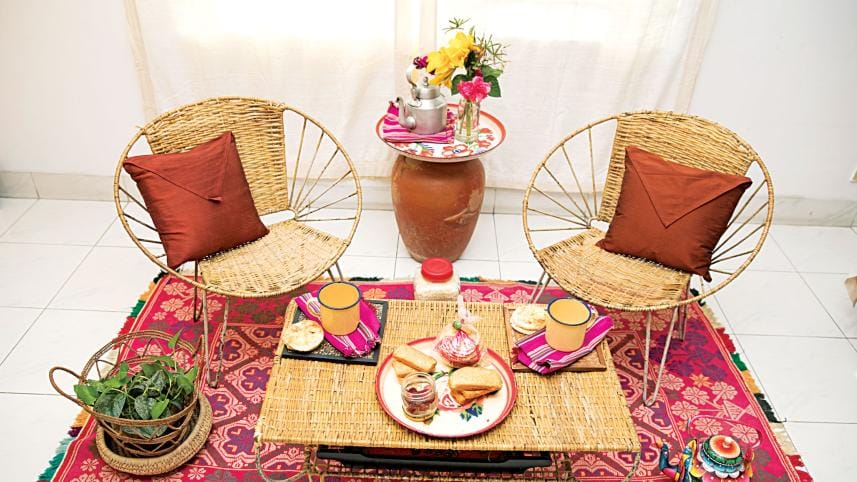
As our lifestyle evolves with time, so do the spaces we find ourselves in. Our changing taste and preferences are often reflected in our homes, offices, the restaurants, the salons, or any place we frequent. There is an expanse of possibilities inside the towering sea that adorns the cityscape, many of which look practically identical from the outside. Each space needs a decor that best captures its purpose, its distinct personality, and not just a line of furnishing to fill up an empty space.
In recent years, there has been a surge towards going back to cultural roots or blending some of its elements into our daily lives. The preferences for interior decor have been no exception either.
Sudeshna Shireen Chowdhury, Founder and Principal Architect of STUDIO.O explains, "People now want something that reflects their taste as well as a part of their heritage especially in corporate setups, we are often requested to add at least one iconic feature of Bangladesh. Designing areas that celebrate Bangladesh's rich cultural legacy in a contemporary setting, has actually been very rewarding, as the result often brings our stunning pieces a lot of appreciation."
However, this blend is as tricky as it is beautiful and it is often very easy to get it wrong. So, where do we start and how do we go about it?
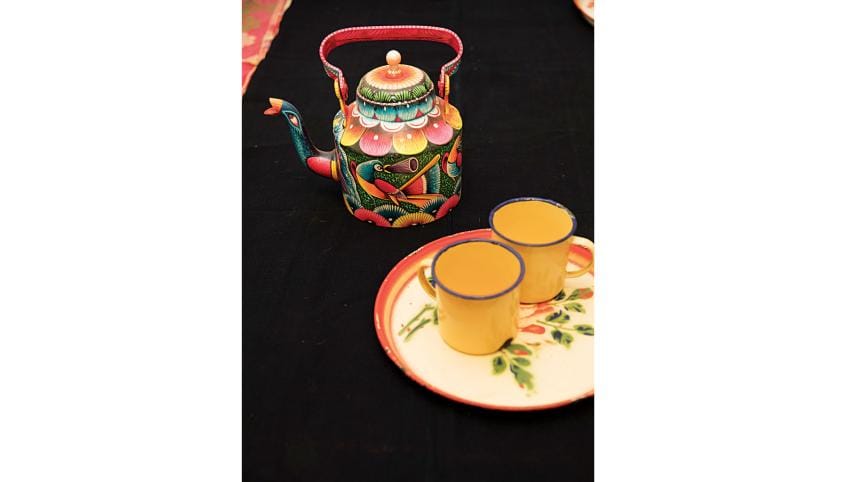
Let's take a closer look.
Weaving tradition into modern spaces
Even the most modern settings can have a story to tell if we pay that kind of attention to its details. A place gains depth, character, and authenticity by including local and heritage elements, which can range from elaborate wall hangings and handcrafted art to old furnishings finding their place in a newer setup.
One of the most striking ways to infuse Bangladeshi culture into interior decor is through wall hangings and artwork. Chowdhury takes pride in knowing that nearly all the work done by her team consists of materials as well as inspiration taken from Bangladesh's perspective.
When talking about a featured wall, she explains that handwoven fabrics and embroidered textiles can be used as eye-catching focal points. One of her more outstanding works features the interior of Todos Santos, a popular Mexican restaurant in Dhaka. Despite catering to Mexican cuisine, Chowdhury has beautifully used Jamdani - inspired patterns inside the restaurant, giving the borders a gravity and effortlessly bringing the cultures together.
Intricately carved wooden mirrors featuring traditional motifs, or mosaic tiles depicting cultural scenes can serve as statement pieces that reflect light and visually expand the space. Even in homes, nothing speaks tradition like living rooms featuring wall art, framed pieces of handloom, centrepieces like an old clay vase or trinket boxes with the old-school carvings.
To add a modern touch, you can always put these works in clean, simple frames or arrange them in a way that frees them from any clutter, portraying them like a piece of pride in your home.
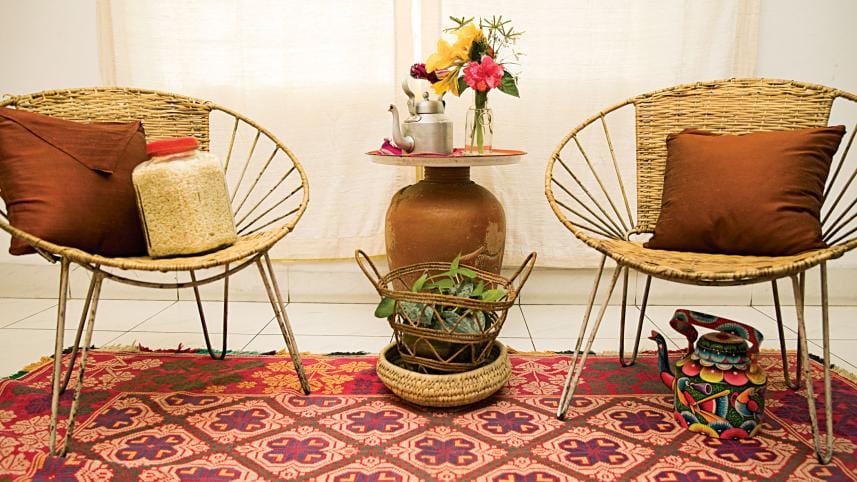
Bring in the vintage furnishings
Remember those old recliners that came with wooden frames while the middle portion would be woven with cane? Or the old shelves where the most treasured ceramic pieces were kept?
After all these years, it's amazing how these beautiful vintage pieces of furniture can now be a gorgeous addition to your home. You can simply opt for clean-lined designs and neutral finishes, allowing the intricate craftsmanship to take the centre stage.
Mixing a bit of old and new, your modern living space can also repurpose old window shutters, setting the tone for nostalgic stories. Handcrafted shelves adorned with traditional carvings or cabinets embellished with inlaid motifs serve as both functional storage units and works of art.
"Believe it or not, the small tools used by local artisans for making block prints on clothes can also be repurposed into door and cabinet knobs, said Chowdhury.
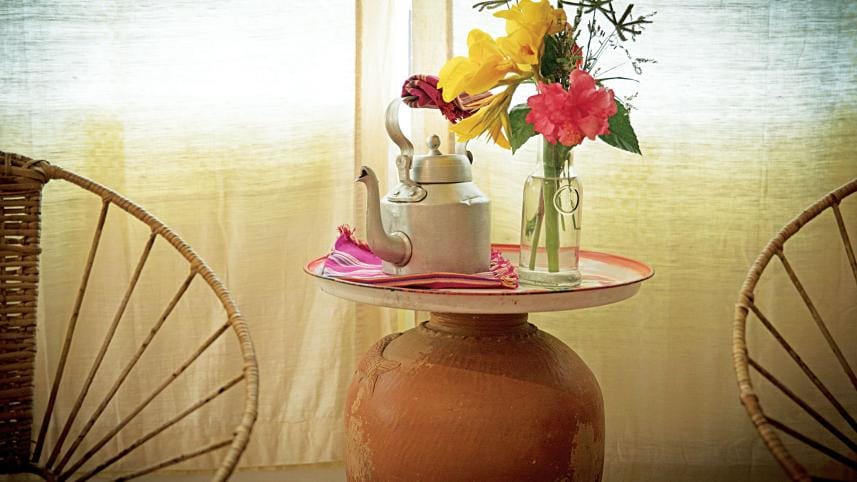
With a gifted vision, she had incorporated another age-old interior portion into a modern architectural design; the mosaic floor. Like borrowing a piece from the past, STUDIO.O worked to take the old mosaic floor portion and bring it to a new apartment, placing it in the lift/lobby area. The results can only be described as stunning.
With movement towards green, the popularity cane and jute are at an all-time high. Cane partitions are making a comeback in commercial spaces, as well as homes.
Bangladesh textile at its best
In an era where chunky furniture is being replaced by simple statement pieces like afghans, rugs, and quilts, perhaps it's time to bring out the classics from the depth of your closets. Since they are frequently fragile and should not be on the ground in busy places, why not include them into your current decor scheme? You can use your traditional tapestry, scarf, or shawl, especially ones with handwork motifs, as a table runner or drape it over your favourite comfortable chair.
A handwoven Nakshi Kantha featuring traditional patterns and motifs, on the other hand, is what you need to add warmth while bringing a beautiful homely accent to your room. Vibrant, patterned rugs are great conversation starters when hung. Do not be afraid to experiment as you bring a touch of fusion to these classic pieces. Go for bold colours, geometric patterns and even textured fabrics, creating a striking contrast of tradition and modernity.
An interesting take by Chowdhury is her work of creating partition with jamdani or handloom. "When framed in a clear glass and placed in a corner where the sunlight is reflected on it, this partition becomes a piece of art."
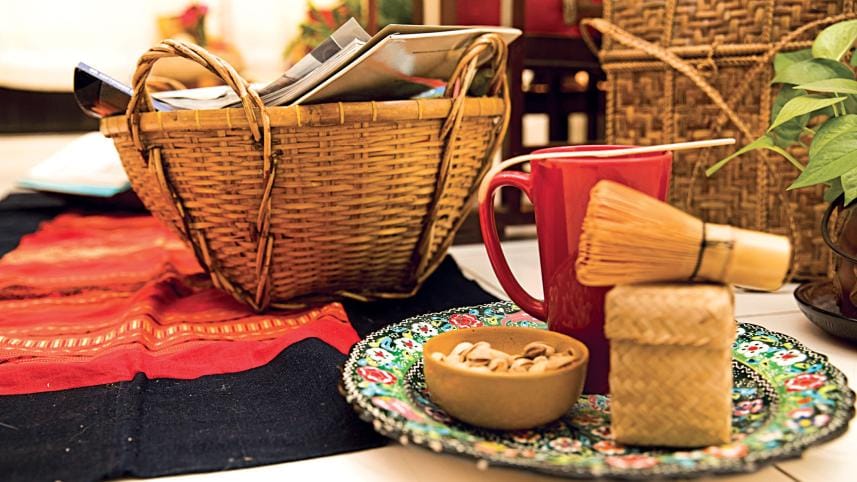
Thinking layers
According to interior designers and architects, layering of a space is just as important as the vision itself. It's not only that one wall, a furniture, or a wall hanging will get all attention. The surroundings must be complementing it.
A hand-woven or embroidered throw can be placed technically before a wall with deeper shades of red, blue, or green while delicately carved wooden figurines or ceramic pottery adorned with traditional designs surround it.
If you feature a bedpost with cane patterns, perhaps the wall behind can have a painting inspired by local landscapes or a print featuring bold motifs. The rest of the décor, including the bedside table or a tall lamp, must be toned down and kept to a minimum, making sure that the bedpost is indeed the showstopper.
Incorporating Bangladesh's cultural treasures into interior decor is not only a celebration of heritage but also an opportunity to create spaces that are truly unique and memorable. It is a powerful way to celebrate Bangladesh's rich cultural heritage while creating spaces that are truly unique and memorable. Whether through traditional textiles, handcrafted furniture, or ornate decorative objects, blending tradition with contemporary design elements allows you to infuse spaces with warmth, personality, and a sense of authenticity into your space.
Photo: LS Archive/ Sazzad Ibne Sayed



 For all latest news, follow The Daily Star's Google News channel.
For all latest news, follow The Daily Star's Google News channel.
Comments